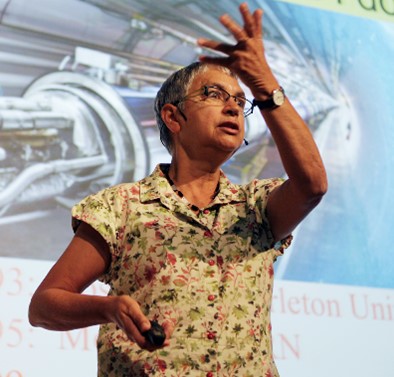Networking event: The tragic destiny of Mileva Marić Einstein
03 oktober 2024 16:00 t/m 17:30 - Locatie: Aula, Commissiekamer 3 | Zet in mijn agenda
Date and time: Thursday, 3 October 16.00 – 17.30
Location: Aula, Commissiekamer 3
Open to all academic staff, PhD students, BSc and MSc students and support staff.
With drinks after the presentation!
The first Tuesday in the month of October is Diversity Day. The TU Delft will celebrate Equity, Diversity and Inclusion (ED&I) in the month of October. DEWIS is contributing by organising a networking event on Thursday 3 October with Pauline Gagnon, physicist, writer and inspirational speaker. Please join us in celebrating Mileva Marić Einstein, Albert Einstein's first wife’s contributions to his extraordinary productivity in the first years of his career.
A first biography of Mileva Marić Einstein was published in Serbian in 1969 but remained largely unknown despite being translated first in German, then in French in the 1990’s. The publication of Mileva and Albert’s love letters in 1987 revealed how they lived together while two recent publications shed more light on Mileva Marić’s life and work. Physicist Pauline Gagnon will review this evidence in its social and historical context to give a better idea of her contributions. In this presentation, Pauline avoids all type of speculation and does not attack Albert Einstein personally, but rather strictly sticks to facts. The audience will be able to appreciate why such a talented physicist has been so unkindly treated by history.
Pauline Gagnon completed her PhD in particle physics at University of California in Santa Cruz. After that, she started her research activities at CERN, the European Laboratory for Particle Physics located near Geneva, where she worked as a Senior Research Scientist with Indiana University. She participated to the discovery of the Higgs boson in 2012 and looked for dark matter within the ATLAS experiment.
From 2011-2014, she joined the CERN Communication group, writing blogs and answering questions from numerous media worldwide. Explaining particle physics in simple and accessible terms became her trademark. In 2014, she wrote a popular science book called “Who cares about particle physics: Making sense of the Higgs boson, the Large Hadron Collider and CERN”, which is also available in seven other languages.
Since retiring in 2014, she gave about one hundred eighty presentations to various audiences in fifteen countries, talking about physics, diversity issues and Mileva Marić Einstein. She is currently writing a screenplay for a mini-series on Mileva Marić Einstein and other women in science.

